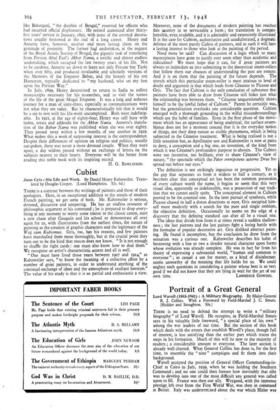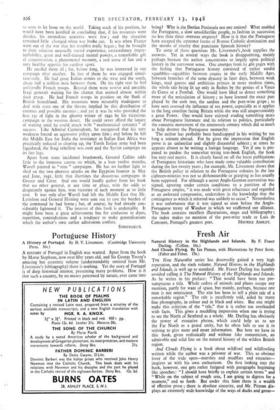Portrait of a Great General
Lord Wavell (1883-1941) : A Military Biography. By Major-General R. J. Collins. With a Foreword by Field-Marshal J. C. Smuts. (Hodder and Stoughton. 30s.) THERE is no need to defend the attempt to write a "military biography" of Lord Wavell. He occupies, as Field-Marshal Smuts says in his valuable little foreword, "a special place of his own" among the war leaders of our time. But the section of this book which deals with the events that establish Wavell's place though full of interest, is less satisfying than the earlier part which traces the steps in his formation. Much of this will be new to the majority of readers ; a considerable amount to everyone. The later section is already well charted. What General Collins has done is, for the first time, to assemble the " nine " campaigns and fit them into their background.
Wavell accepted the position of General Officer Commanding-in- Chief at Cairo in, July, i939, when he was holding the Southern Command ; and no one could then foresee how inevitably that role was to develop into one of the most difficult any general was called upon to fill. France was then our ally. Weygand, with the immense prestige left over from the First World War, was then in command at Beirut. Italy was undetermined about the war which Hitler was so soon to let loose on the world. Taking stock of his position, he would have been justified in concluding that, if his resources were slender, his immediate anxieties were few ; and the situation remained little changed when war broke out. It was when France went out of the war that his troubles really began ; but he brought to their solution unusually varied experience, extraordinary imper- turbability, great and well-trained mental powers, a remarkable gift of concentration, a phenomenal memory, a real sense of fun and a very healthy appetite for outdoor sport.
He needed them all ; for, before long, he was immersed in one campaign after another. In five of them he was engaged simul- taneously. He had great Italian armies to the west and the south, about half a million men between them. On his right rear he had unfriendly French troops. Beyond them were restive and unstable Iraqi generals waiting for the chance that seemed almost within their grasp. He had French troops in position on the flank of British Somaliland. His resources were miserably inadequate to deal with even one of the threats implied by this distribution of enemies and possible enemies ; and yet it was he who provided the first ray of light in the gloomy winter of 1940 by his victorious campaign in the western desert. He could never afford the luxury of waiting until he could attack with "mathematical certainty" of success. Like Admiral Cunningham, he recognised that his very weakness forced an aggressive policy upon him ; and before he left the Middle East for India the resistance in Italian East Africa was practically reduced to clearing up, the Tenth Italian army had been liquidated, the Iraqi rebellion was over and the Syrian campaign on its last legs.
Apart from some incidental brushwork, General Collins adds little to the immense canvas on which, in a bare twelve months, Wavell painted in " nine " campaigns. He has no further light to shed on the two abortive attacks on the Egyptian frontier in May and June, 1941, little that illumines the disastrous campaigns in Greece and Crete. And one would hardly gather from his book that no other general, at any time or place, with the odds so desperately against him, won victories of such moment at so little cost. It was only after Wavell had left the Middle East that Mr. Lyttelton and General Haining were sent out to ease the burden of the command he had borne ; but, of course, he had already con- siderably lightened it. The interest of this book is undeniable. It might have been a great achievement but for confusion in dates, repetition, contradictions and a tendency to make generalisations which the author's own earlier admissions confute.
STRATEGICUS.



































 Previous page
Previous page